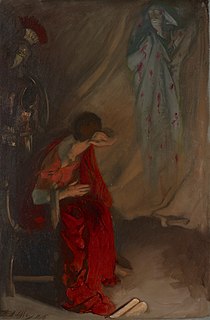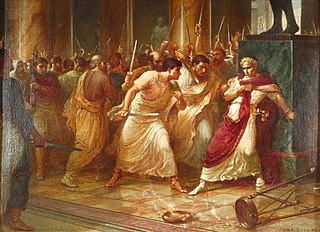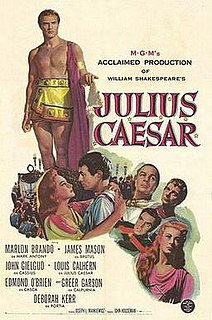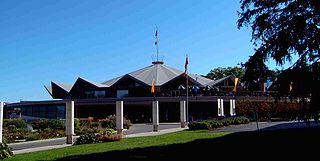
The Ides of March is the 74th day in the Roman calendar, corresponding to 15 March. It was marked by several religious observances and was notable for the Romans as a deadline for settling debts. In 44 BC, it became notorious as the date of the assassination of Julius Caesar, which made the Ides of March a turning point in Roman history.

The Tragedy of Julius Caesar (First Folio title: The Tragedie of Ivlivs Cæsar) is a history play and tragedy by William Shakespeare first performed in 1599.

Publius Servilius Casca Longus was one of the assassins of Julius Caesar. He and several other senators conspired to kill him, a plan which they carried out on 15 March, 44 BC. Afterwards, Casca fought with the liberators during the Liberators' civil war. He is believed to have died by suicide after their defeat at the Battle of Philippi in 42 BC.
Gaius Julius Caesar was a Roman military and political leader and one of the most influential men of classical antiquity.
The assassination of Julius Caesar refers to the stabbing attack that killed Roman dictator Julius Caesar in 44 BCE.

Et tu, Brute? is a Latin phrase literally meaning "and you, Brutus?" or "also you, Brutus?", often translated as "You as well, Brutus?", "You too, Brutus?", or "Even you, Brutus?". The quote appears in Act 3 Scene 1 of William Shakespeare's play Julius Caesar, where it is spoken by the Roman dictator Julius Caesar, at the moment of his assassination, to his friend Marcus Junius Brutus, upon recognizing him as one of the assassins. The first known occurrences of the phrase are said to be in two earlier Elizabethan plays; Henry VI, Part 3 by Shakespeare, and an even earlier play, Caesar Interfectus, by Richard Edes. The phrase is often used apart from the plays to signify an unexpected betrayal by a friend.

Jonathan Stephen Geoffrey King, known professionally as Jonathan "Nash" Hyde, is an Australian-English actor. Hyde is perhaps best known for roles as Herbert Arthur Runcible Cadbury in the 1994 comedy film Richie Rich, Samuel Parrish and Van Pelt in the 1995 fantasy adventure film Jumanji, J. Bruce Ismay in the 1997 epic romantic film Titanic, Culverton Smith in The Memoirs of Sherlock Holmes, Warren Westridge in creature feature film Anaconda, Dr. Allen Chamberlain in the 1999 adventure horror film The Mummy, and Eldritch Palmer in the FX TV series The Strain. Although an Australian citizen, he has mostly lived in the United Kingdom since 1969, after his family left Australia.

Every Man out of His Humour is a satirical comedy written by English playwright Ben Jonson, acted in 1599 by the Lord Chamberlain's Men. It is a conceptual sequel to his 1598 comedy Every Man in His Humour. It was much less successful on stage than its predecessor, though it was published in quarto three times in 1600 alone; it was also performed at Court on 8 January 1605.

Julius Caesar is a 1953 American film adaptation of the Shakespearean play, directed by Joseph L. Mankiewicz and produced by John Houseman for Metro-Goldwyn-Mayer. It stars Marlon Brando as Mark Antony, James Mason as Brutus, John Gielgud as Cassius, Louis Calhern as Caesar, Edmond O'Brien as Casca, Greer Garson as Calpurnia, and Deborah Kerr as Portia.

Julius Caesar is a 1970 film adaptation of William Shakespeare's play of the same name, directed by Stuart Burge. It stars Charlton Heston as Mark Antony, Jason Robards as Brutus, Richard Johnson as Cassius, John Gielgud as Caesar, Robert Vaughn as Casca, Richard Chamberlain as Octavius, and Diana Rigg as Portia. It was an independent production of Commonwealth United Entertainment, filmed in England and Spain. It is the first film version of the play made in colour.

Gaius Julius Caesar, one of the most influential men in world history, has frequently appeared in literary and artistic works since ancient times.

This page describes the production history of the Stratford Festival.
Dead Caesar was a 2007 stage show written by Australian comedian Chris Taylor from The Chaser. The satirical show parodied Julius Caesar, a play by William Shakespeare.

Julius Caesar Ibbetson was a British 18th-century landscape and watercolour painter.
The Shakespeare by the Sea Festival is an annual event that runs throughout the months of July and August in St. John's, Newfoundland and Labrador, Canada that presents outdoor productions of the plays of William Shakespeare, as well as pieces related to the province and culture.

The dogs of war is a phrase spoken by Mark Antony in Act 3, Scene 1, line 273 of English playwright William Shakespeare's Julius Caesar: "Cry 'Havoc!', and let slip the dogs of war."
Shakespeare Writing "Julius Caesar", also known as La Rêve de Shakespeare, was a 1907 French short silent film directed by Georges Méliès.

The last words of the Roman dictator Julius Caesar are disputed. Ancient chroniclers reported a variety of phrases and post-classical writers have elaborated on the phrases and their interpretation. The two most common theories – prevalent as early as the second century AD – are that he said nothing or that he said, in Greek, καὶ σύ, τέκνον.

The Assassination of Julius Caesar is a 1888 painting by William Holmes Sullivan which depicts the assassination of Julius Caesar at the hands of his fellow senators. The painting, like Sullivan's other works, is based on Shakespare's play the Tragedy of Julius Caesar, depicts the Act III, Scene 1, and is placed in the Royal Shakespeare Theatre. A similar version by Sullivan is named Et tu Brute.
Et tu, Brute? is a Latin-language phrase and quote from William Shakespeare's play Julius Caesar.
















